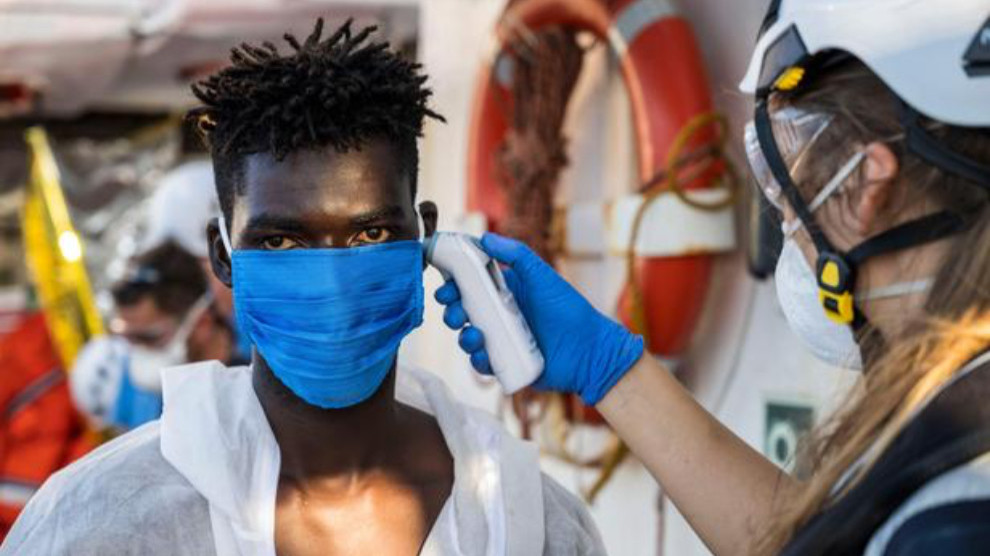AI: Malta's illegal tactics mar another year of suffering
“Malta is stooping to ever more despicable and illegal tactics to shirk their responsibilities to people in need," said Elisa De Pieri, Regional Researcher at Amnesty International.
“Malta is stooping to ever more despicable and illegal tactics to shirk their responsibilities to people in need," said Elisa De Pieri, Regional Researcher at Amnesty International.

The Maltese government has resorted to dangerous and illegal measures for dealing with the arrivals of refugees and migrants at sea, which are exposing countless people to appalling suffering and risking their lives, Amnesty International revealed today in a report “Waves of impunity: Malta’s human rights violations Europe’s responsibilities in the Central Mediterranean”. As Amnesty is launching this new report, despair is growing aboard the Maersk Etienne, which has been denied a port to disembark for over a month, after rescuing 27 people on a request from Maltese authorities.
Amnesty International said: “The Maltese government’s change in approach to arrivals in the central Mediterranean in 2020 has seen them take unlawful, and sometimes unprecedented, measures to avoid assisting refugees and migrants. This escalation of tactics included arranging unlawful pushbacks to Libya, diverting boats towards Italy rather than rescuing people in distress, illegally detaining hundreds of people on ill-equipped ferries off Malta’s waters, and signing a new agreement with Libya to prevent people from reaching Malta.”
“Malta is stooping to ever more despicable and illegal tactics to shirk their responsibilities to people in need. Shamefully, the EU and Italy have normalized cooperation with Libya on border control, but sending people back to danger in Libya is anything but normal,” said Elisa De Pieri, Regional Researcher at Amnesty International.
“EU member states must stop assisting in the return of people to a country where they face unspeakable horrors.”
According to Amnesty International, some of the actions taken by the Maltese authorities may have involved criminal acts being committed, resulting in avoidable deaths, prolonged arbitrary detention, and illegal returns to war-torn Libya.
The authorities also used the COVID-19 pandemic as a pretext to declare that Malta was not a safe place to disembark - to discourage people from seeking safety and a decent life in Europe.
“The abusive practices by Malta are part and parcel of wider efforts by EU member states and institutions to outsource the control of the central Mediterranean to Libya, in order that EU-supported Libyan authorities might intercept refugees and migrants at sea before they reach Europe,” the organization said.
People are then returned to Libya and arbitrarily detained in places where torture and other ill-treatment is highly likely. From the beginning of January to 27 August 2020 7,256 people were ‘pulled back’ to Libya by the EU-supported Libyan Coast Guard, which was often alerted of the presence of boats at sea by airplanes engaged in Frontex and other EU operations.
The Easter Monday pushback
The case of the “Easter Monday pushback” illustrates the desperate lengths to which the Maltese authorities are willing to go to prevent people arriving on their shores.
On 15 April 2020, a group of 51 people, including seven women and three children, were unlawfully returned to Tripoli after being rescued in Malta’s search and rescue region by the commercial fishing boat Dar Al Salam 1.
The boat, which had been contracted by the Maltese government, took those onboard back to Libya and handed them over to the Libyan authorities, exposing refugees and migrants – who had just survived a deadly shipwreck – to further risks to their life.
Five people were dead when the vessel reached Libya, and the survivors reported that a further seven people were missing at sea. Survivors reported that those on board were not given medical assistance. In an official statement the Maltese authorities confirmed they had coordinated the operation.